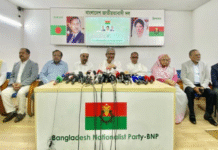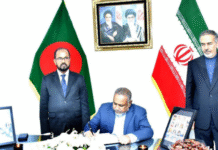M. Shahidul Islam
Two broader parties are operating now within Bangladesh’s political landscape: traitors and patriots. Like Ulysses, we proffer to rally behind the latter.
Bangladesh inching to the precipice of darkness. The propagators of the partisan politics aside, people otherwise known as the conscience of the society are getting swept by partisan influences under the immoral gravitation of greed, fear and, what seems like a ubiquitous ‘tide of the time.’
Yet, in newspaper columns and TV talk shows, many of those partisan intellectuals pose as being a bit wiser than Socrates. The underlying message they convey, however, is the one that is indicative of their desperate quest for survival in a poisoned ambiance in which one must either subscribe to the ruling oligarchs’ prescriptions and propagandas, or vanish.
Power of truth
But holding onto the truth is too important to save the self and the society, and it needs courage – a lot of it. The power of truth being invincible, opportunists survived only the mock test of time, not the thread-bare scrutiny of history. Now, as the nation seems to have begun the long-awaited tryst with history, the AL’s house of card faces the most intractable challenge to its existence.
Fires are raging within the party in all educational institutions and in the wards and villages. The AL’s former planning minister, AK Khondoker, is facing the axe from a regime that, according to Khondoker, had no preparation to wage a war against the Pakistan army in 1971 and had rather engrossed itself with bargaining for power with the Pakistani military regime that had slaughtered thousands of Bengali soldiers, police, intellectuals and ordinary people between March 25-30 (1971) due to the absence of any planning and pre-warning by the political leadership of an impending military crackdown by the Pakistani army.
Khondoker, a former Air Vice Marshal and the deputy commander of the Bangladesh forces during the 1971 war, is neither a maverick nor an imbecile to state something he is not aware of. An introvert by nature, he had represented the Bangladesh forces at the Pakistani military’s surrendering ceremony on December 16, 1971, and, at the exiled government headquarters in Kolkata, he worked hand in hand with Syed Nazrul Islam, Tajuddin Ahmed, Captain Monsur Ali, et al, while Sheikh Mujib was languishing in a dark Pakistani prison cell.
How strange is it that many of the AL stalwarts have now resorted to branding Khondoker an agent of Pakistan for penning some indigestible truth of the liberation war in his book; 1971: Inside Out. The same accusation was labeled earlier against the war’s Commander in Chief, General MAG Osmani, and the most influential sector commander, Ziaur Rahman, who had had the temerity to rebel against the Pakistani authorities, kill his commanding officer, loot the armoury, flee from Chittagong cantonment and organize and wage a fierce war against the enemies. These war heroes and many others embraced death to liberate a nation in which those who philosophized and indulged in rhetoric only want to re-write history.
Good news
The good news is: in the manner an egg is crushed first before making an omelet out of it, our history has begun to make sense at last. It’s a matter of pleasure that the nuggets of the liberation war’s unpalatable truths are presented afresh before the nation by those who lived through it and steered the course of the war and the nation’s history from its very cradle. Many others who now claim to have fought the war of liberation must not forget that a war is fought by soldiers who need training, planning, regimentation and the means to wage it. That myth has begun to burst.
As well, look closely to see how many gallantry award winners of the war the AL as a party can field? That alone should suffice to establish the fact that Bangladesh’s peoples’ war of liberation had both political and military leaderships like any other war anywhere in the world. Those who subscribe to the mendacities that the AL alone had liberated this country are liars and hypocrites masquerading as patriots and intellectuals. Squabbles over history are holding us back. It’s too divisive to digest any longer.
Coincidental or not, this debate over the truthfulness of history springs at a time when the design for an enduring autocracy is at its final stage. Yet, ironically, the streets are bereft of any substantive political activism amidst the autocratic dictat of the ruling oligarchs and the debates in living rooms and the TV screens are at best muted.
Three recent decisions of the government to (1) revert the power of the judges’ impeachment to parliament, (2) craft a media and broadcasting guideline tantamount to censoring free speech, and, (3) impose restrictions on certain NGO activities have enough philosophical fodder in them to make any man of conscience quiver.
Myths versus facts
The opportunism of the ruling oligarchs has many facets. The AL sought and got the caretaker system in 1990 but had done away with it to deprive others from assuming political power. The plan is always to remove the ladder once my climb is done. Likewise, it had snatched the power of the parliament to impeach the judges in 1974 through the introduction of a one party rule and the accompanied 4th amendment to the constitution. Now it does not like its own harvest. These and other policies of this party make it impossible for anyone to understand what exactly is AL’s political philosophy, if any.
Fact is: at the root of these policies and planning lay the question of the regime’s legitimacy and its pursuit to stifle any form of dissent. The media being the mirror of any society, the proposed broadcasting laws and regulations aim at scaring the media away from reporting or broadcasting the ill-doings of the illegitimate regime. The NGOs being vociferous against rights violations and corruptions, they too need to the clipped likewise.
Finally, the judges, on whom people depose their trust to derive justice, must also be eclipsed in order to dissuade them from rendering decisions that may hurt the image of the illegitimate regime; as the court’s Suo Moto move lately to unearth the truth behind the sensational seven murders in Narayangonj did.
Had that not been the real intent, why the reform of the judiciary does not confine to making justice fair and easily accessible to all citizens? Why the existing laws are not allowed, through political interferences, to deal with any fabricated reporting in the media, as well as the advertising space and the timing brought to a tolerable and decent limit? Why the false NGOs supportive of the regime are allowed to receive government funding while the independent ones are constantly chastised?
Message from Constitution
The parliament is the fountain of all power, according to the Constitution. Those who crafted the Constitution had envisioned a parliament composed of all parties and opinions and representative of the majority of the population. If the existing parliament lacks such traits, which it does beyond any shred of doubt, its power must be curtailed further instead of endowing it with more of it. That is the innate message of constitutionalism, as far as we understand it.
The purported induction into and changes of laws have nothing to do with an outdated and moth-eaten legal system. This is not the reform needed at a time when the judiciary is overburdened with cases; most of the judges are partisan appointees; people are made judges without any vetting of their antecedent and the level of knowledge and wisdom; TV stations are given to people who can propagate in favour of the regime, and, a bulk of the print media is run by non-professionals of crony denominations.
On the other hand, internationally acclaimed NGOs like the Odikhar or the Transparency International have had rough ridings under this regime and faced persecutions for disseminating truth. If all these can occur unfettered under existing laws, what more is needed? Why re-writing history and changing laws to cling onto power shall be the preoccupation of a regime when the polity of the nation suffers under extremely poor governance, despicable and intolerable law and order situation, crony corruption and fiefdom-based development undertakings? Where is the focus on the economy when external and internal investments have stalled to choke of all employment opportunities of the new labour force?
All is not doom and gloom
Besides, the moral bankruptcy of the nation is exposed by the number of conscientious people shrinking by the day.
Yet, all is not doom and gloom, not as yet. Among the framers of the 1972 Constitution, Barrister Kamal Hossain is now spearheading a movement of the lawyers to stop the 16th constitutional amendment that aims at empowering the parliament with the power to impeach the judges. Another leading member of the 1972 Constitutional committee, Barrister Amirul Islam, has also objected to the purported changes to the Constitution. Even the former law minister of the incumbent regime, Barrister Shafiq, had voiced his consternation and termed it unnecessary.
With respect to the proposed media gagging laws, a bunch of journalists and intellectuals is acting under the radar screen to make it happen in the manner the regime wants it, it was discovered. The same group of partisan media personalities still carries a grudge against Amar Desh editor Mahmudur Rahman who is languishing in the prison for allowing publication of a message already published in the facebook and other electronic devices.
Earlier, this opportunistic bunch maintained their silence when the Odikhar executive Adilur Rahman was arrested, tortured and charged. And, not a single word came from their mouth when journalist Rabiul of the Inquilab was arrested, tortured in custody and charged for an alleged crime of creating communal discord by reporting the scheme of corruption of a Hindu police officer. A corrupt is a corrupt, Hindu or Muslim.
If the people from the media maintain silence over such fundamental rights abuses, they are neither patriot nor professionals. In the face of massive rights abuses in the wake of the January 5 election, we on these pages shouted aloud that the PM and her party was abandoning their exist strategy by holding an election in which even their own supporters did not vote and, 153 of the MPs (more than half of the total) got elected uncontested.
Squandering the exit route?
That we proved right is evident now from the policies being pursued by this regime to cling onto power indefinitely. Like an army trapped by the enemy, the AL-led regime too is trapped in a vicious cycle created by its own follies and myopic outlook. It must surrender or get crushed. By not adhering to the democratic means of re-election, it had squandered its exit route and forfeited the opportunity to withdraw with little or no harm. It may be late now, but not impossible altogether.
The AL must remember that, in the pages of history, killers of democracy thrived only by supplanting it with a mass revolution. Cuba’s Fidel Castro, China’s Mao Tsetung, etc. are some of the illustrious examples of such a variety. Neither the demagogues nor the dictators under the garb of democracy could exit from power without getting humiliated and crushed by the combined power of the people.
Source: Weekly Holiday









